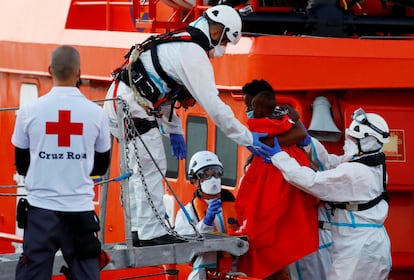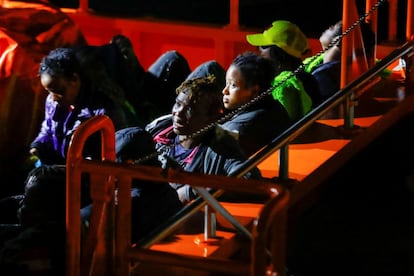Canary Islands migrant protection system unprepared for surge in underage arrivals
Aid services are warning about a rise in the number of women and children reaching the Spanish archipelago, where there is a lack of specific protocols to cover their needs


“I’ve been working here for over 25 years and I’d never seen anything like it,” says Alejandra Torres, managing director of a children’s hospital in Spain’s Canary Islands, to describe the dramatic situation of irregular migrants arriving in the archipelago over the past week.
In recent days, a two-year-old child from Mali has died in the hospital after being rescued in critical condition from a migrant boat that departed from Dakhla in Western Sahara, on Africa’s northwestern coast. An adult woman remains in the intensive care unit, and another 11 minors and seven adults are still receiving medical care.
It is not common for boats to show up with so many minors and so many womenAlejandra Torres, managing director of a children’s hospital in Spain’s Canary Islands
The police have opened an investigation into the case of the boat that carried the two-year-old child and 51 other people. “It’s not normal for people making such a short journey, between two and four days, to arrive in such poor condition,” says a source at the Canaries Healthcare Service. One theory is that a few adults may have hoarded all the food and water on board. “Passengers have been threatened, so it is hard to get them to explain the detail of their trip,” says one police source.
The toddler was the 19th migrant to die so far this year on the so-called Canary Islands route, a dangerous Atlantic Ocean journey that has become one of the main gateways into Europe following the crackdown on crossings via the Mediterranean. In October of last year, there were 2,006 unaccompanied children and youths under state care in the Canaries. Right now that figure has risen to 2,658.
The islands have been experiencing a rise in migratory pressure since late 2019. So far this year around 3,000 people have arrived in the Spanish archipelago on vessels departing from the African coast. This figure is twice as high as over the same period last year, although it is far below the September-to-December period, when there were peaks of over 8,000 arrivals a month.
But something has been changing in recent days.

“It is not common for migrants to arrive in such poor health, but above all, it is not common for boats to show up with so many minors and so many women,” notes Torres. “We are worried and dismayed at these numbers.”
“We are observing a rise in the number of women and children arriving in the Canaries,” agrees María Jesús Vega, the spokesperson in Spain for the United Nations Refugee Agency (UNHCR).
“It’s true that we are surprised at the rate of arrivals of women and minors, but we still have to wait to see if it represents a changing trend,” adds Íñigo Vila, director of the Emergency Unit of the Red Cross.
During the first three months of the year, women went from making up 5% of boat arrivals to representing 12%, according to official figures cited by refugee aid sources. And there has been a 4% rise in the number of underage arrivals.
“There is great instability in the region: war in Mali’s case, and high violence levels in countries such as Guinea. To this must be added human rights violations linked to gender issues, genital mutilation, forced marriages and human trafficking,” says Vega.
A strained system
This increased presence of women and children poses a new challenge to a system devised largely for healthy undocumented men. The Ombudsman has criticized the lack of specific protocols, which means that women and minors go through the same procedure as any other migrant: they are taken to a temporary holding center or to a police station, where they are formally held for 72 hours so they can be identified and questioned.
Medical sources in the Canary Islands said that the deceased child’s mother spent several nights at a migrant camp in Barranco Seco until she was able to prove her relationship to her daughter and allowed to spend the last few hours with her in the hospital. And hospital sources said that several children have spent entire days all alone, despite existing protocols that say that separating children from adults claiming to be their direct relatives should only be done in cases of “imminent risk.”
“What’s been happening with the latest arrivals evidences how many gaps remain in the assistance to women and children,” says a source in the Canaries healthcare service, speaking on condition of anonymity.
The UNHCR spokesperson says Spain needs to improve the asylum request system for vulnerable groups like women and children. “These are individuals who are fleeing situations of violence and who have made very complicated and risk-fraught journeys, for instance from Ivory Coast to Burkina Faso, to Mali, to Mauritania and to Dakhla, from which point they usually travel to the Canary Islands,” explains Vega. “There have been improvements since last year in terms of registering requests, but more resources are needed and the procedure has to be speeded up.”
The Ombudsman has underscored the hurdles undermining migrants’ right to seek asylum. Although over 23,000 people arrived in the archipelago last year, there are hardly any Africans among the 4,000 protection applicants whose requests were processed, representing 8.6% of the total, compared with 90% filed by Latin Americans who arrived in Spain by air. According to the Ombudsman, this does not mean that African migrants are not fleeing conflict and persecution, but simply that they face numerous barriers when seeking asylum.
English version by Susana Urra.
Tu suscripción se está usando en otro dispositivo
¿Quieres añadir otro usuario a tu suscripción?
Si continúas leyendo en este dispositivo, no se podrá leer en el otro.
FlechaTu suscripción se está usando en otro dispositivo y solo puedes acceder a EL PAÍS desde un dispositivo a la vez.
Si quieres compartir tu cuenta, cambia tu suscripción a la modalidad Premium, así podrás añadir otro usuario. Cada uno accederá con su propia cuenta de email, lo que os permitirá personalizar vuestra experiencia en EL PAÍS.
¿Tienes una suscripción de empresa? Accede aquí para contratar más cuentas.
En el caso de no saber quién está usando tu cuenta, te recomendamos cambiar tu contraseña aquí.
Si decides continuar compartiendo tu cuenta, este mensaje se mostrará en tu dispositivo y en el de la otra persona que está usando tu cuenta de forma indefinida, afectando a tu experiencia de lectura. Puedes consultar aquí los términos y condiciones de la suscripción digital.








































